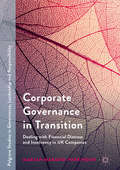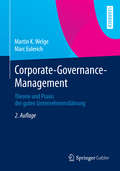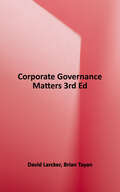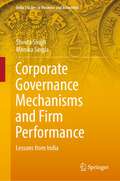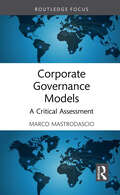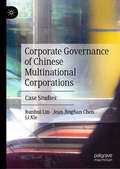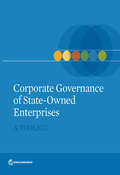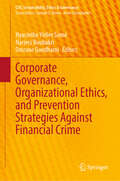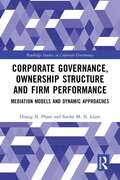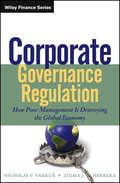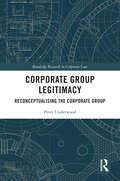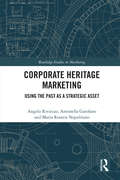- Table View
- List View
Corporate Governance in the Knowledge Economy: Lessons from Case Studies in the Finance Sector (Palgrave Studies in Accounting and Finance Practice)
by Paul David GriffithsWith the transition into the Knowledge Economy, a formidable series of new challenges arise within the corporate governance space. This book tackles the issue of corporate governance along two axes. Firstly, it confronts the developments in corporate governance within the context of the Knowledge Economy and all its implications in relation to the pre-eminence of intangible assets, the advent of technologies such as smartphones and advanced forms of artificial intelligence, and cultural changes associated with the incorporation of Gen Y into the workforce and the proliferation of social networks and effects such as Big Data and cyber-threats. Secondly, it highlights the challenges for multinational organizations and the tension that exists between headquarters and subsidiary offices due to the need to combine the corporation’s ethical culture and corporate governance values with the institutional forces of the subsidiaries’ context. The combination of these two axes addressed viz a viz the relationship between senior management and the rank and file of the organization to create an ethical corporate culture leads to a completely different positioning of corporate governance and make the book truly unique and of interest to researchers, students of corporate finance and corporate governance alongside practitioners within financial organizations and more broadly.
Corporate Governance in the United Kingdom: Past, Present and Future
by William Forbes Lynn HodgkinsonThis book provides an overview of the development of corporate governance with a focus on literature concerning the UK.
Corporate Governance in Transition: Dealing With Financial Distress And Insolvency In Uk Companies (Palgrave Studies In Governance, Leadership And Responsibility Ser.)
by Marjan Marandi ParkinsonThis book presents an account of legal, economic and managerial perspectives on governance in situations of financial distress and insolvency. It uses detailed real-life case studies of executive decision making to explore and illustrate the discussion. The book deals with the emergence of corporate governance as a framework of checks and balances on executive decision-making, before moving to the core issues of governance during financial distress and insolvency and alternative informal and formal rescue. Identifying and reviewing turnaround strategies and formal rescue processes available to management, the book also examines the increasing importance of creditors and their impact on business decision-making. The book provides a detailed interpretation of governance in five mega insolvencies in retail and construction following the financial crisis in 2008. It also sets out a methodology which is designed to inform and help those readers seeking to analyse and interpret director behaviour in such circumstances.
Corporate-Governance-Management: Theorie und Praxis der guten Unternehmensführung
by Martin K. Welge Marc EulerichDas Lehrbuch erläutert umfassend alle betriebswirtschaftlichen Perspektiven und Fragestellungen guter Corporate Governance aus theoretischer und praktischer Sicht. Es beschreibt die Aufgaben der Akteure und gibt Handlungsempfehlungen zur operativen sowie strategischen Unternehmensführung und -überwachung durch Vorstand bzw. Aufsichtsrat. Der Fokus liegt dabei auf den Strukturen, Organen und Akteuren der Corporate Governance, den strategischen und operativen Kernprozessen in den Unternehmen, insbesondere innerhalb des Vorstandes und Aufsichtsrats, sowie möglichen Steuerungsinstrumentarien.Für die dritte Auflage wurde das Buch umfassend aktualisiert und überarbeitet, insbesondere durch die Vorgaben des neustrukturierten Deutschen Corporate Governance Kodex.
Corporate-Governance-Management: Theorie und Praxis der guten Unternehmensführung
by Martin K. Welge Marc EulerichDas Lehrbuch erläutert umfassend alle betriebswirtschaftlichen Perspektiven und Fragestellungen guter Corporate Governance aus theoretischer und praktischer Sicht. Es beschreibt die Aufgaben der Akteure und gibt Handlungsempfehlungen zur operativen sowie strategischen Unternehmensführung und -überwachung durch Vorstand bzw. Aufsichtsrat. Der Fokus liegt dabei auf den Strukturen, Organen und Akteuren der Corporate Governance, den strategischen und operativen Kernprozessen in den Unternehmen, insbesondere innerhalb des Vorstandes und Aufsichtsrats, sowie möglichen Steuerungsinstrumentarien.Die zweite, grundlegend überarbeitete Auflage bindet zahlreiche neue Inhalte ein. Neben einem umfassenden Kapitel zu zwischenmenschlichen Interaktionen in Vorstand und Aufsichtsrat (sog. „Board Dynamics“) werden mehrere internationale Corporate-Governance-Systeme verglichen sowie die Bereiche Family Governance und Public Governance beschrieben. Ausführliche Fall- und Praxisbeispiele verdeutlichen dem Leser die große praktische Relevanz des Themas.
Corporate Governance Matters: A Closer Look at Organizational Choices and Their Consequences
by David Larcker Brian TayanFully updated for the latest research, trends, and regulations, the Third Edition of this book offers comprehensive and objective information for everyone seeking to improve corporate governance--from directors to institutional investors to policymakers and researchers. To help you design highly effective governance, the authors thoroughly examine current options, reviewing what is and isn't known about their impact on organizational performance. Throughout, they take a strictly empirical and non-ideological approach that reflects rigorous statistical and research analysis and real-life examples. They address issues ranging from board structure, processes, operations, and functional responsibilities to institutional investors, outside stakeholders, and alternative forms of governance.
Corporate Governance Mechanisms and Firm Performance: Lessons from India (India Studies in Business and Economics)
by Shveta Singh Monika SinglaThis book begins by analysing the various corporate governance mechanisms explored in the extant literature and determining their effectiveness in enhancing the firm value using multivariate analysis. The findings are of global relevance as the corporate governance regulations of most countries focus on independent directors as the mainstay of good governance. The empirical evidence from the first objective of this study corroborates the claim that independent directors do not strengthen the firms’ governance quality. The book is one of the few works to have analysed the possible reasons behind the ineffectiveness of the independent directors. Also, in view of the famous concept of the bundle of governance mechanisms, it might be possible that the independent directors strengthen the firms’ governance quality indirectly by strengthening other governance mechanisms. This aspect too has little precedence. This study adopts a novel moderation and mediation approach to analyse the monitoring behaviour of independent directors in relation to other governance mechanisms. The work is a must read for corporate players as well as researchers and scholars studying this discipline.
Corporate Governance Models: A Critical Assessment (Routledge Focus on Business and Management)
by Marco MastrodascioThe activities carried out in a business organization stem from the contribution of subjects who cooperate in the expectation of obtaining adequate rewards. The ability of organizations to reach a specific level of performance is influenced by the ownership structure, while the management is directed and controlled through a set of rules and incentives. This set regulates the distribution of rights and responsibilities among the board, company management and stakeholders, and it defines the corporate governance model adopted by the organization. The collapse of global organizations across the world have undoubtedly revealed the inherent flaws in the contemporary corporate governance practices. As a result of these international scandals, a great deal of multidisciplinary research has been growing restlessly to define the specificities of each corporate governance model, however, lacking a specific investigation into the presumed existence of the most suitable one. By favouring the synthesis and the inductive procedure, this book analyses the potential existence of the most appropriate corporate governance model based on comparative international analysis of cultural, social and economic factors influencing the organization’s choice regarding the corporate governance model to be adopted. This volume will be of interest to researchers, academics, professionals, and students in the fields of corporate governance, international business, and law.
Corporate Governance of Chinese Multinational Corporations: Case Studies
by Runhui Lin Jean Jinghan Chen Li XieThis book is the first to explore the issue of corporate governance in China's new corporations. With rapid development over the last two decades, China has seen compelling achievements in overseas investment. Specifically, an increasing number of Chinese companies have been “going out” to become multinational enterprises. From the practical view, corporate governance issues have been identified in the literature as one of the most important factors in determining whether these Chinese multinational enterprises succeed or not. However, existing literature provides little investigation and understanding about corporate governance of Chinese multinational enterprises. This book fills that gap and will be of value to corporate executives, scholars of China's economy, and journalists.
Corporate Governance of State-Owned Enterprises
by World Bank PublicationsThis Toolkit provides an overall framework with practical tools and information to help policymakers design and implement corporate governance reforms for state-owned enterprises. It covers the key elements of corporate governance, including legal and regulatory framework, state ownership arrangements, performance management systems, financial and fiscal discipline, boards of directors, transparency and disclosure, and protection of shareholders in mixed ownership companies. Experience shows that no one approach is universally applicable and the choice of measures depends on country and enterprise circumstances. The Toolkit thus provides a range of frameworks, concepts, case examples, checklists, and model documents that together aim to help government officials make the appropriate choices for their circumstances. The Toolkit concludes with guidance on managing the reform process, in particular how to prioritize and sequence reforms, build capacity, and engage with stakeholders.
Corporate Governance, Organizational Ethics, and Prevention Strategies Against Financial Crime (CSR, Sustainability, Ethics & Governance)
by Hyacinthe Yirlier Somé Narjess Boubakri Omrane GuedhamiThis book examines how corporate ethics, social responsibility, and prevention strategies against financial crime may remedy shortcomings of corporate governance. Corporate governance structures and mechanisms may contribute to enhancing the value of integrity in organizational life. Nonetheless, executives and directors who emphasize a structural and procedural way of thinking often miss the point. Corporate governance structures and mechanisms can favor practices of integrity and righteousness. But those structures and mechanisms have deficiencies since they cannot allow the organization to avoid corporate deviancy and delinquency. The book describes how corporate governance and social responsibility reports and programs may allow executives and directors to deepen the meaning of corporate governance, as it is related to organizational culture. Furthermore, the volume discusses how corporate governance structures and mechanisms (including the board of directors and shareholder activism) might have a significant impact on the way integrity is safeguarded in an organization. The contributions shed light on methods to clarify and extend the implications of corporate governance while taking risk management strategies into account.
Corporate Governance, Ownership Structure and Firm Performance: Mediation Models and Dynamic Approaches (Routledge Studies in Corporate Governance)
by Hoang N. Pham Sardar M. IslamThe relationship between ownership structure and firm performance has been studied extensively in corporate finance and corporate governance literature. Nevertheless, the mediation (path) analysis to examine the issue can be adopted as a new approach to explain why and how ownership structure is related to firm performance and vice versa. This approach calls for full recognition of the roles of agency costs and corporate risk-taking as essential mediating variables in the bi-directional and mediated relationship between ownership structure and firm performance. Based on the agency theory, corporate risk management theory and accounting for the dynamic endogeneity in the ownership–performance relationship, this book develops two-mediator mediation models, including recursive and non-recursive mediation models, to investigate the ownership structure–firm performance relationship. It is demonstrated that agency costs and corporate risk-taking are the ‘missing links’ in the ownership structure–firm performance relationship. Hence, this book brings into attention the mediation and dynamic approach to this issue and enhances the knowledge of the mechanisms for improving firm’s financial performance. This book will be of interest to corporate finance, management and economics researchers and policy makers. Post-graduate research students in corporate governance and corporate finance will also find this book beneficial to the application of econometrics into multi-dimensional and complex issues of the firm, including ownership structure, agency problems, corporate risk management and financial performance.
Corporate Governance Practices in India
by Priyanka Kaushik SharmaCorporate Governance Practices in India examines corporate governance practice in Indian industry. This book critically analyses the governance practice and evaluates the needs of corporate governance in the two major industries in India: Auto Industry and Heavy Engineering Industry. The study explores the state of compliance of the key governance parameter in both the industries in line with the mandatory and non-mandatory requirements stipulated by the Revised Clause 49 of (SEBI) ListingAgreement as also the provisions required by the Companies Act, 1956. The book aims to study the concept of corporate governance and check the level of compliance of corporate governance codes in Auto Industry and Heavy Engineering Industry in India, and draw comparisons in the adoption of corporate governance practices by Auto Industry vis-#65533;-vis Heavy Engineering Industry.
Corporate Governance Reforms in the EU: Do They Matter and How?
by Iryna Ivaschenko Petya Koeva BrooksA report from the International Monetary Fund.
Corporate Governance Regulation: The changing roles and responsibilities of boards of directors (Routledge Contemporary Corporate Governance)
by Alice KlettnerCorporate governance regulation has been through numerous cycles of reform, and yet we still see instances of companies collapsing suddenly. Codes of corporate governance have been implemented in most developed countries, recommending detailed governance frameworks for publicly listed companies and their boards, but our understanding of how these codes influence behaviour is still limited. In this book, Alice Klettner draws on the domains of law and business to explore the effectiveness of corporate governance codes. Using interview evidence from company directors and officers, as well as published evidence of companies’ corporate governance systems, she discusses the theory and practice of corporate governance and its regulation – with a focus on how corporate governance codes can affect board behaviour and company performance. This interdisciplinary book will be valuable reading for advanced students and researchers of corporate governance, and will also be directly relevant to governance practitioners and policymakers.
Corporate Governance Regulation
by Nicholas V. Vakkur Zulma J. HerreraWhy U.S. corporate governance regulation has lost its way, and what must be done to improve itModern history persuasively demonstrates the inexorable link that binds comprehensive regulation to the global economy. This important book, rather than simply recount a litany of corporate governance failures, persuasively explains why, despite policymakers' best intentions, regulation has failed in the modern era. An objective study intended for a diverse readership, Corporate Governance Regulation unveils the underlying, root causes of regulatory failure. The result: A compelling and original analysis, broadly suited for a global audience of all backgrounds.Written by published, subject-area experts, the authors carefully delineate how U.S. corporate governance regulation, beginning with Sarbanes Oxley, lacks an adequate rational basis, as may be attributed to a non-existent policy dialogueThe witnessed result: A conspicuous lack of regulatory efficacy, enormous costs, coupled with paltry benefitsThe focus is upon reigniting a stalled, non-productive policy dialogue, by eschewing stale, overly-polemicized arguments, as needed to develop a common groundDrawing from an eclectic, analytic framework, governance experts Nicholas Vakkur and Zulma Herrera offer both the professional and global citizen alike a multi-dimensional understanding of issues critical to global economic health. Nuanced and persuasively argued, Corporate Governance Regulation represents a formidable catalyst in the elusive, ongoing quest for global economic stability.
Corporate Governance, Responsibility and Sustainability: Initiatives In Emerging Economies
by Arindam Banik Ananda Gupta Pradip BhaumikCorporate Governance, Responsibility and Sustainability investigates various dimensions of corporate governance issues in key emerging economies such as China, India, Brazil, South Africa and Russia. The book explores a number of issues in the areas of corporate governance framework, market discipline and building an efficient, competitive market.
Corporate Governance, Sustainability, and Information Systems in the Aviation Sector, Volume I (Accounting, Finance, Sustainability, Governance & Fraud: Theory and Application)
by Kasım Kiracı Kıymet Tunca ÇalıyurtThis book delves into corporate governance, sustainability, and information systems related to the aviation sector. Due to globalization and rise in cross-border business, the aviation sector has become an essential means of transport. However, the industry has tremendous impact on social, economic, and natural environments and carries significant risks. The book explores such issues plaguing the aviation sector under three key areas: CSR and sustainability, information systems and risk management, and corporate governance and accountability in the airline industry. The book concludes with an analysis of the impact of COVID-19 crisis on the industry and ways to respond and recover from the effects of the pandemic.
Corporate Governing in Latin America: The Importance of Scandals to Institute Change
by Jonathan Callund Gonzalo Jiménez-Seminario Neil PyperGrounded in institutional theories, this volume offers a framework for understanding the evolution of corporate governance in the six leading Latin American countries, namely Argentina, Brazil, Chile, Colombia, Mexico, and Peru.Applying inductive qualitative methods, it postulates the notion of governing as a dynamic, emergent and contextual process and traces its evolution and adaption to the different configurations of institutional logics in each country and the region as a whole over several decades.Adopting corporate governance scandals as the lens through which to observe institutional change in each country, this book reveals the sources of societal transformations, identifying key lessons as well as meaningful setbacks along the way.This edited collection helps appreciate the role and interactions of corporate elites, stakeholders and watchdogs, including the visible hands of government and multinational corporations, presenting comparisons across the countries, the region and the broader evolution of governing practices around the globe.The result is a book combining scholarly rigor and practical relevance, looking to serve as an emerging markets benchmark guide for practitioners, researchers and thinktanks alike.
Corporate Group Legitimacy: Reconceptualising the Corporate Group (Routledge Research in Corporate Law)
by Peter UnderwoodThis book focuses on the legitimacy of corporate power wielded by corporate groups, integrating legal doctrine, economic analysis, and theoretical approaches. It reassesses how corporate groups can maintain legitimacy whilst exercising corporate power.Corporate groups are a prominent commercial feature of many jurisdictions and present unique challenges. The book argues that when analysed through the lens of corporate social responsibility, a legitimacy deficiency emerges. This arises from a lack of historical debate, diluted control mechanisms, and inflated growth, utilising unique features of the corporate group. It explores how the magnified power of the corporate group presents acute challenges for corporate legitimacy. Data is utilised alongside current examples of corporate groups which identify structural architectural patterns. It explores new technologies such as Artificial Intelligence and blockchain as ways of attaining legitimacy. It presents methods of attaining legitimacy for the continued wielding of power to be held within corporate groups.This book spans several research interests under the corporate law umbrella. It will be of interest to traditional black letter company lawyers. Additionally, it will be of interest to those who have an interest in business and those who are interested in the role of technology.
Corporate Groups and Shadow Business Practices
by Linn Anker-SørensenThe uniqueness of this book is its conceptualization of a corporate group as a system of interaction, comprised of nodes, links and internal governance tools. This framework can be used to understand what constitutes a group, based on affiliation-linkages. By increasing our perception of group-structuring we can assess the extent to which existing laws address all variables. If the law does not consider certain variables to be used for identifying groups, a case of shadow business may be identified. Group-transparency is a recurring topic on the regulatory agenda. In this book, three legal domains are analysed questioning whether specific amendments have led to increased group-transparency: the control-definition for consolidated accounts, shareholder-transparency in company law, and major holding disclosure in listed companies. This book identifies deficiencies of the law in obtaining its regulatory objective of group-transparency, and proposes an interpretative solution based on Systems Thinking.
Corporate Heritage Marketing: Using the Past as a Strategic Asset (Routledge Studies in Marketing)
by Angelo Riviezzo Antonella Garofano Maria Rosaria NapolitanoCorporate Heritage Marketing introduces the reader to the design and implementation of a heritage marketing strategy. It aims to propose a new and integrated reading of this marketing strategy, both from a theoretical and a managerial perspective. This book sets out to answer key questions, such as: how is it possible to engage all the company's stakeholders by exploiting corporate heritage? It also aims to discuss the basic principles for achieving a successful marriage between marketing and heritage. By highlighting the results of a research focused on 20 Italian companies, the book proposes a model for the development and implementation of a heritage marketing strategy. The nature of this book, being both theoretical and empirical, can contribute to increasing the curiosity and interest towards heritage marketing of both academics and practitioners.
The Corporate Hero's Journey: Your Path to Being an Impact Intrapreneur
by Heiko Hosomi SpitzeckImpact intrapreneurs at some of the most powerful organizations in the world are designing new, more sustainable businesses from within. They put their values to work and transform their corporations into a force for good. In a corporate world that still largely prioritizes profit above all else, these people shine a light on how to balance profit with impact, and the inspirational stories captured in this book guide leaders and managers to do the same.The lack of purpose beyond profit is causing millions of people to question their work and even to leave the corporate world altogether. Companies are struggling with recruitment and retention, as people seek a greater sense of purpose. For many, this would mean finding a way to use their work as a platform for positive social and environmental impact. This book will inspire this change for leaders seeking a different and better way forward. Structured around the stages of Joseph Campbell’s hero’s journey – upon which Star Wars was based – this book combines the philosophy of Star Wars with inspiring stories of impact intrapreneurs. You’ll get to know Corporate Jedi such as Susie Lonie and Nick Hughes, who, while working for Vodafone in Kenya introduced a mobile payment method which brought financial inclusion to millions; Myriam Sidibé at Unilever, who turns making soap into saving lives; and Gib Bulloch, founder of Accenture Development Partnerships, which provides first-class consulting services to NGOs leveraging their impact. With actionable advice, such as how to create a business case, how to measure social impact, and more, the book is not only an entertaining read, but also helps executives apply insights to their own daily work.Written for leaders, managers, and all professionals looking to create positive impact through their work, this book will give future Corporate Jedi the courage and tools to use the force of business for good.
Corporate Imagination Plus
by Jim BandrowskiSuperior companies are innovators, but it is not creativity alone that leads to increased market share, higher return on investment, or greater profit. Rather, success in business is ideas PLUS action. Bandrowski shows that the business objective of developing new ideas is not to find solutions for their own sake, but to seek new ways of viewing a business and therefore compete more effectively. Using hundreds of examples, the author develops a five-step plan that will help a senior manager create and implement a company-wide vision, or assist a division or department manager in setting a strategic direction for his or her unit.


